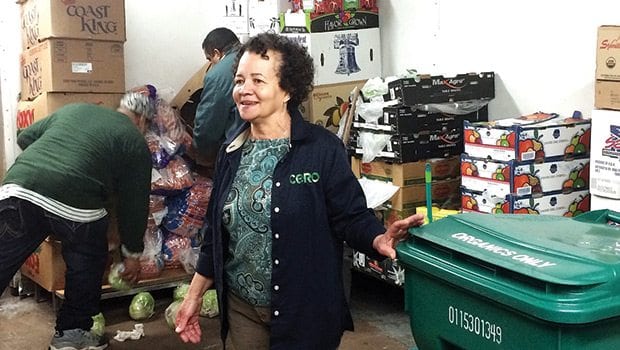Worker-owned firm turns trash to cash
CERO cooperative processes recycling, compost for restaurants

With its recycling and composting business, Cooperative Energy, Recycling and Organics, known as CERO Cooperative, has dedicated its efforts to creating green jobs in the local food economy. The effort is something its leaders view as for the Boston community, but now CERO is asking the community to show its support — with cash.
In the new climate of crowdfunding and crowdsourcing, CERO is using what is known as a Direct Public Offering to raise the money it needs to back the business. Once approved through compliance regulators, a DPO opens the doors to non-accredited investors or anyone who wants stock in the company for putting money into it.
While CERO’s founders, a group of Dorchester, Roxbury and East Boston worker-owners, have been developing the recycling business since 2013, the business started operations in October 2014 and has hit the ground running.
The company takes waste from Boston restaurants and grocery stores, and then sorts it for recyclable materials and organic food waste for composting. Company officials estimate in its first year it will divert more than 1,000 tons of organic food waste from landfills and incinerators and return it to the food chain as composted soil for area farms.
CERO’s customer base includes America’s Food Basket, Northeastern University, the Daily Table and food business incubator CommonWealth Kitchen. Those companies account for 50 percent of the six tons of trash CERO is recycling each week.
Yet, as the customers rave, banks and lenders — as any small business owner knows — shake their heads “no” at the low-dollar loan amount CERO needs to continue to grow the business. The $350,000 CERO is seeking does not offer enough profit to traditional lenders for them to care.
But the Boston community certainly seems to. So far CERO has raised about $250,000 through its direct public offering. With an early June end date set for the DPO, CERO’s leaders are hopefully they can hit the target. Either way, the community has given the business the financial capital that banks and lenders would not.
“For us, a quarter of million dollars from investors in the community is a great vote of confidence,” said Lor Holmes, a CERO worker-owner who manages the organization.
By the numbers
$350,000 Loan amount sought by CERO to continue to grow the business.
$250,000 Amount raised by CERO through its direct public offering.
$2,500 Minimum investment amount for CERO’s DPO
4 percent The return per year that CERO stock is targeted to produce
50 The number of investors in the DPO CERO has so far
Trash matters
Those who invest in CERO receive stock in the company that is targeted to produce a 4 percent return a year. The minimum investment is $2,500 and CERO has about 50 investors so far in the DPO.
According to Holmes, the money raised to date is enough to move forward with the business, but the additional capital will be used to fuel growth.
She does point out, however, that CERO is not a nonprofit organization — the goal is to be a profitable and sustainable business.
“We are set to break even in year three and we are on target for that,” Holmes said.
Aside from the environmental benefits of reducing trash and putting organic waste back into the food loop — as compost for farms — CERO’s main selling point to customers is that it can save them money.
Since Boston does not pick up commercial trash, restaurants and grocery stores, for example, have to pay. The cost is tied directly in to weight so any trash that CERO can eliminate through recycling ultimately reduces the load and saves money.
Holmes said CERO cuts most of its customers’ trash bills in half.
“Anybody who is in a food-related business, generally their waste stream is 50 percent compostable,” Holmes said. “Once you take what is compostable out of the trash you would be surprised about how little there is — assuming you are recycling plastic and glass.”
The company charges customers a fee for pickup, which typically is around $50 for a ton of waste. Commercial waste management companies often charge several hundred dollars or more to pick up a similar amount.
Sustainable jobs
What could ultimately be the key to success for CERO, though, is that the company is in the right place at the right time as the clamor for sustainable businesses and green jobs continues to rise throughout Boston. The talk increasingly is about transitioning to a different kind of economy — one that is more friendly to people and the planet.
“At CERO we are really happy to be playing a part in developing a green, sustainable and local economy,” Holmes said.
In fact, the company vision is not just about recycling and composting, but also energy production, remanufacturing and urban agriculture.
Holmes began her work at CERO as a paid startup manager to get the business off the ground, through a grant that helped her to do so. But her passion for the businesses was such that she stayed on even after the grant money expired, becoming a worker-owner like the other founders.
Currently, CERO has five worker-owners, a board of directors and six employees doing commission sales work to get customers.
Tim Hall, one of the founding CERO worker-owners, calls his colleagues social entrepreneurs. In his vision, CERO is taking environmental action and turning it into economic opportunity by providing jobs.
“This is not just about compost and recycling it is about including people that have been left out of this economy,” Hall said.
Hall would love to connect with the City of Boston to start a pipeline for formerly incarcerated workers or unemployed people from low-income areas.





